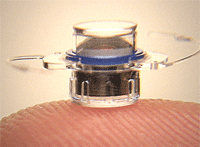 Earlier this month, the Food and Drug Administration approved the first-of-its-kind Implantable Miniature Telescope (IMT, VisionCare Ophthalmic Technologies) to improve vision in patients with end-stage age-related macular degeneration.
Earlier this month, the Food and Drug Administration approved the first-of-its-kind Implantable Miniature Telescope (IMT, VisionCare Ophthalmic Technologies) to improve vision in patients with end-stage age-related macular degeneration.
The IMT, invented by Isaac Lipshitz, M.D., of Tel Aviv, Israel, is indicated for monocular implantation to improve vision in patients 75 years of age and older with stable, severe to profound vision impairment (best-corrected distance visual acuity of 20/160 to 20/800) caused by bilateral central scotomas associated with end-stage AMD.
Smaller than a pea, the telescope is implanted in one eye in an outpatient procedure. In the implanted eye, the IMT enlarges images over a wide area of the retina to improve central vision, while the non-operated eye provides peripheral vision for mobility and orientation.
Clinical trials of the IMT showed that one year after implantation, 67% of patients achieved an improvement in distance visual acuity of three lines or greater in the study eye, compared with 13% of unimplanted fellow eye controls. Approximately 25% of telescope-implanted eyes achieved a five-line or greater improvement in visual acuity, compared with 2% of fellow eyes.1
Optometrists can play a key role in the comanagement of these patients. “Proper eye selection chosen for implantation with the telescope prosthesis appears to be an important if not critical factor in determining patient satisfaction for visual processing and functional success,” writes Susan A. Primo, O.D., M.P.H., who followed patients implanted with the IMT.2 Dr. Primo is an associate professor of ophthalmology and the director of vision and optical services in the low vision clinic at Emory Eye Center, in Atlanta. “Optometrists can aid the multidisciplinary team by preoperatively determining which eye, if implanted, offers the optimal potential functional benefit for appropriate candidates.”
1. Hudson HL, Lane SS, Heier JS, et al; IMT-002 Study Group. Implantable miniature telescope for the treatment of visual acuity loss resulting from end-stage age-related macular degeneration: 1-year results. Ophthalmology. 2006 Nov;113(11):1987-2001.
2. Primo SA. Implantable miniature telescope: lessons learned. Optometry. 2010 Feb;81(2):86-93.

